We may not have the course you’re looking for. If you enquire or give us a call on 01344203999 and speak to our training experts, we may still be able to help with your training requirements.
We ensure quality, budget-alignment, and timely delivery by our expert instructors.
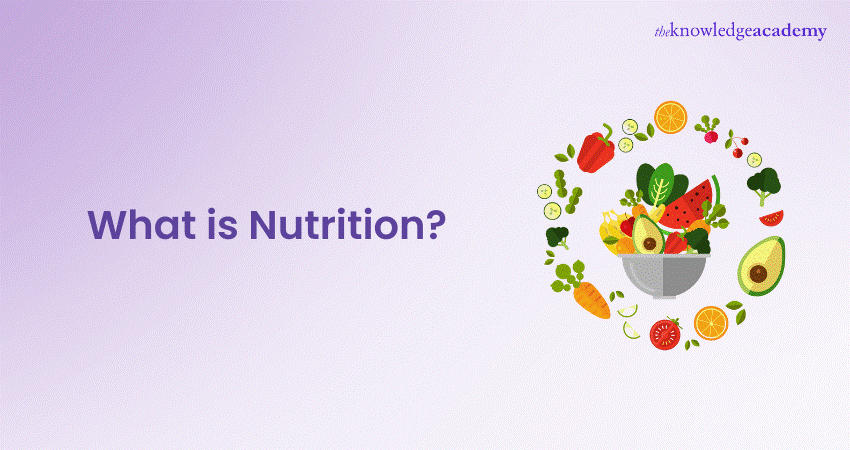
Have you devoted any thought to What is Nutrition beyond your plate? The components on your plate represent nutrition because they function as your body's power supply and disease prevention system while forming the basis for living a healthy and contented life. Modern medicine defines nutrition as providing your body with all the essential requirements needed to prosper.
So, how do we define about What is Nutrition within its bigger conceptual framework? Experts consider nutrition to be the fundamental source which provides both life energy and longevity. Nutrition acts as your daily foundation for optimal health by enhancing emotions and sustaining physical wellness in order to maximise your life quality every day.
Table of Contents
1) Understanding What is Nutrition
2) Components of Nutrition
3) The Role of Nutrition in Health
4) Sources of Nutrients
5) Assess Nutritional Needs
6) Factors Affecting Nutritional Choices
7) Misconceptions About Nutrition
8) Tips for a Balanced Diet
9) Common Myths About Nutrition
10) Future Trend of Nutrition
11) What are the 3 Core Elements of a Healthy Dietary Pattern?
12) Why Nutrition is Important?
13) Conclusion
Understanding What is Nutrition
Nutrition is far more than just satisfying hunger; it’s a complex and dynamic process that fuels our bodies, impacts our health, and shapes our lives. At its core, nutrition encompasses the journey of nutrients from the plate to the intricate biochemical processes that sustain life within us. This process involves a symphony of interactions between food and the body, including digestion, absorption, transport, and utilization of nutrients for energy, growth, repair, and overall functionality. Within this framework, understanding the types of nutrition helps further explain the varied ways in which nutrients support our body’s needs as outlined in the Foodmap Diet Guide.
Nutrition's Impact on Health
The significance of Nutrition stretches beyond mere sustenance; it's the cornerstone of good health and vitality. A balanced diet replete with a rainbow of nutrient-rich foods is a potent disease prevention and management tool. Discover the essence of well-being to uncover What is Nutrition and its impact on your health. Adequate intake of vitamins, minerals, and antioxidants supports immune function, rendering our bodies more resilient against infections and chronic illnesses.
Empowering Through Knowledge
Cultivating a fundamental understanding of Nutrition is empowering our health. It's about deciphering labels, recognising nutrient-rich choices, and appreciating the profound impact of dietary habits on our bodies and minds. By acknowledging the Importance of Nutrition and its intricate interplay within our physiology, we pave the way for healthier lives, heightened energy, improved mental clarity, and longevity. Ultimately, Nutrition isn't just about what's on our plates; it's about the profound influence our choices hold over our life's narrative.
Components of Nutrition
Below the following are the components of Nutrition:
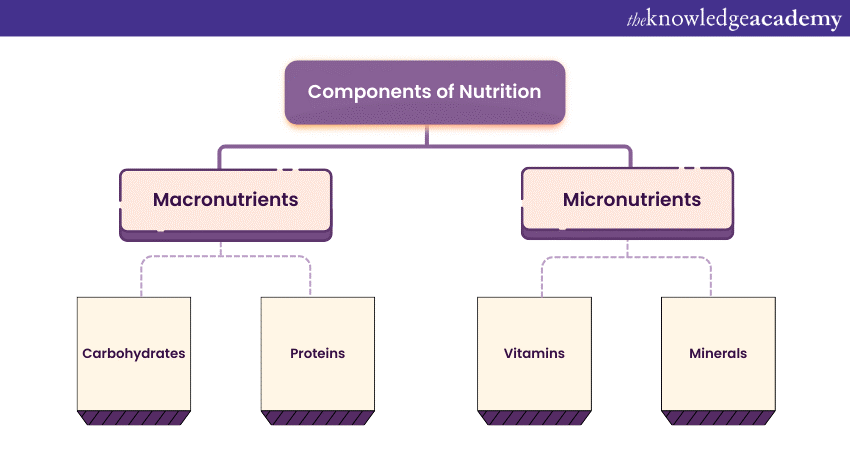
Macronutrients
Macronutrients are nutrients required in relatively large quantities, essential for various bodily functions. The primary macronutrients include carbohydrates, proteins, fats, and water.
Carbohydrates
Carbohydrates are a major energy source and include sugars, starch, and Fibre.
a) Sugars: Simple carbohydrates that are quickly broken down and absorbed by the body, providing rapid energy. However, they do not sustain fullness and can cause spikes in blood sugar levels, which can increase the risk of type 2 diabetes, as outlined in the Blood Sugar Diet Plan Guide.
b) Fibre: A type of carbohydrate that the body partly breaks down for energy. Some types are metabolised by gut bacteria, while others pass through the body. Fiber and unprocessed starches are complex carbs that take longer to digest, helping maintain fullness and reducing the risk of diabetes, colorectal cancer and cardiovascular disease
Sources: Whole grains, fruits, vegetables, beans, lentils
Proteins
Proteins consists of amino acids, which are organic compounds vital for the body's functions.
a) Essential Amino Acids: Can be obtained from food as the body cannot produce them.
b) Complete Proteins: Foods that contain all essential amino acids. Most animal-based foods are complete proteins, while most plant-based foods are not. Vegans need to consume a variety of foods to get all essential amino acids.
Sources: Meat, fish, dairy, eggs, beans, lentils, tofu, nuts
Fats
Fats are necessary for:
a) Lubricating joints
b) Hormone production
c) Absorbing certain vitamins
d) Reducing inflammation
e) Preserving brain health
The type of fat consumed matters:
a) Unsaturated Fats: Healthier fats are found in olive oil, nuts, and avocados.
b) Saturated Fats: Typically found in animal products, excessive consumption can lead to health issues.
Sources: Olive oil, avocados, nuts, seeds, fatty fish
Water
Water is crucial for many bodily processes, and the adult human body is up to 60% water. It does not provide energy but is essential for hydration.
a) Hydration Recommendations: Generally, 2 litres (8 glasses) of water per day is recommended, but it can vary based on factors like body size, age, activity levels, and environmental conditions.
b) Dietary Sources: Water can also be obtained from fruits and vegetables.
Sources: Water, fruits, vegetables

Achieve your wellness goals! Engage with our Healthy Lifestyles Training and unlock the potential for a healthier, happier you.
Micronutrients
Micronutrients are vital in small quantities, including vitamins and minerals. Manufacturers sometimes fortify foods with these nutrients, such as cereals and rice.
Minerals
The body requires carbon, hydrogen, oxygen, and nitrogen, along with dietary minerals like iron and potassium. A varied and balanced diet typically provides necessary minerals, but supplements may be recommended if deficiencies occur. For those following a keto diet, a Keto Diet Plan Guide can help you track essential minerals and nutrients to ensure you're meeting your body's needs while staying within the diet’s guidelines.
Here are some essential minerals and their functions:

Energize your life! Dive into our Active and Healthy Lifestyles Training and discover ways to incorporate fitness into your routine.
Vitamins
Vitamins are essential in small amounts, some of which act as antioxidants, protecting cells from damage by removing free radicals.
Water-Soluble Vitamins:
The following are the Water-soluble Vitamins:

Fat-Soluble Vitamins:

Antioxidants:
Antioxidants can be vitamins, minerals, proteins, or other molecules that help remove free radicals, preventing cell damage and disease.
Remember, multivitamins are available, but it's crucial to consult a doctor before starting any supplements
Fuel your body with knowledge! Explore our Nutrition Course to learn how to make informed food choices for optimal health.
Phytonutrients
You can discover phytonutrients, which scientists also name phytochemicals throughout plant-based foods. Phytonutrients are substances based on plant foods that help prevent diseases while supporting overall health. However, they do not serve vital functions similar to vitamins or minerals.
Types of Phytonutrients and Their Functions
Phytonutrients are categorised into several types, each with unique functions and health benefits:
Flavonoids
What Are They?
Many fruits and vegetables contain flavonoids which represent a phytonutrient group. These plant compounds demonstrate tremendous potential against inflammation, and they promote antioxidant benefits.
Where to Find Them?
Berries such as blueberries and strawberries, together with citrus fruits, oranges, and lemons, as well as tea types green and black, represent common sources of flavonoids.
Carotenoids
What Are They?
Plant pigments called carotenoids produce the yellow and, orange and red colorations you see in fruits and vegetables. Turning into Vitamin A precursors while functioning as antioxidants stands as one of these compounds' key properties.
Where to Find Them?
The nutrients can be found in high concentrations in carrots and sweet potatoes along with leafy vegetables like spinach and kale and tomatoes.
Polyphenols
What Are They?
Plant-based polyphenols function as defensive antioxidants to protect plants from UV radiation exposure as well as pathogen invasion.
Where to Find Them?
Plentiful sources of plant-based polyphenols can be found in nuts and seeds alongside red wine and dark chocolate and both grapes and apples.

The Role of Nutrition in Health
Nutrition is fundamental to our physical, mental, and emotional well-being. It empowers us to make informed dietary choices for a healthier life.
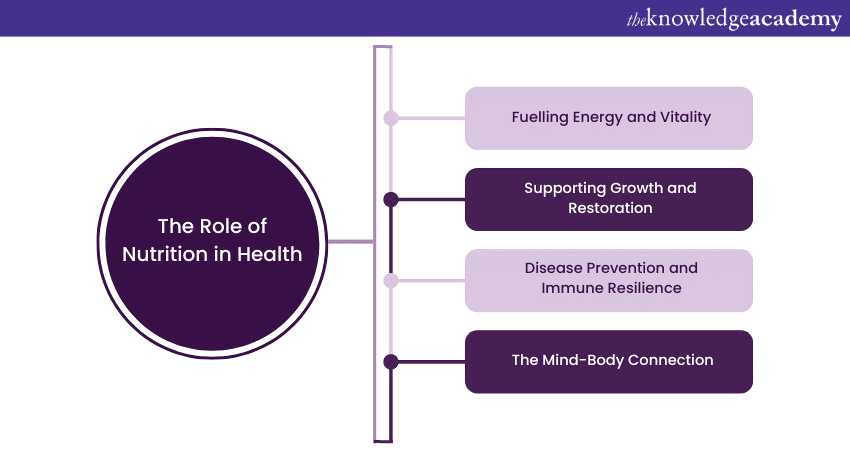
Fuelling Energy and Vitality
Macronutrients—carbohydrates, proteins, and fats—are essential for energy. Carbohydrates provide immediate energy, proteins support muscle development and biochemical reactions, and fats store energy and insulate the body.
Supporting Growth and Restoration
Proper Nutrition is important for growth and development from infancy to adulthood. It ensures bone elongation, muscle strengthening, and organ maturation. During pregnancy, it supports both mother and child, and nutrients aid in tissue repair and renewal.
Disease Prevention and Immune Resilience
Nutrient-rich foods, especially those high in vitamins, minerals, and antioxidants, protect against diseases. Antioxidants prevent cellular damage, while vitamins and minerals support the immune system, helping to fend off infections.
The Mind-Body Connection
Nutrition impacts mental and emotional health. Omega-3 fatty acids improve brain health and may alleviate depression and anxiety. B vitamins help produce neurotransmitters that regulate mood and behaviour.
Transform your health journey! Engage in our Nutrition and Fitness Training for a holistic approach to wellness and vitality.
Sources of Nutrients
For overall health, ensure your diet includes the following essential nutrient sources:
Carbohydrates
Role: Provide energy for the body.
Sources: Whole-grains (brown rice, quinoa), fruits (apples, bananas), and legumes (lentils, chickpeas).
Tip: Complex whole grain carbohydrates should replace refined carbohydrates as they deliver prolonged energy benefits.
Proteins
Role: Our muscles depend on these nutrients to function properly while simultaneously repairing themselves and growing stronger.
Sources: Lean meats (chicken, turkey), fish (salmon, tuna), plant-based options (tofu, beans, lentils).
Tip: People should combine plant proteins with animal proteins to balance their daily nutrition.
Fats
Role: The body uses these structures to support cells and provide insulation for the brain and internal energy storage capability.
Sources: A healthy fat intake should include olive oil, avocado oil, almonds, walnuts, chia seeds, and flaxseeds.
Tip: Prioritise your consumption of unsaturated fats above all else as saturated fats and trans fats should remain limited.
Vitamins and Minerals
Role: Proper body function regulation and strong immune health preservation occur through these nutrients.
Sources: To meet nutritional requirements, you need colourful fruits along with vegetables (orange for vitamin C, spinach for iron) and fortified food selections such as cereals.
Tip: You should reach for multicoloured fruits and vegetables to access various nutrients in your diet.
Hydration
Role: Your body stays hydrated while temperature control functions, and digestive system remains active.
Sources: Water and water-rich foods like cucumbers, watermelon, and lettuce.
Tip: Add water consumption to your daily routine aiming for eight glasses each day but adjust this rate according to bodily movement and environmental temperatures.
Assess Nutritional Needs
Proper nutrition is not one-size-fits-all. Here’s how to evaluate and meet your specific requirements:
a) Personalised Assessment: Age, together with gender activity level and healthcare status, determine individual nutrient requirements.
b) Dietary Guidelines: Follow the Recommended Daily Amount (RDA) standards for essential nutrient reference purposes.
c) Health Monitoring: The detection process for addressing both nutritional shortfalls and surpluses, including Blood Type considerations, happens through routine blood examinations and medical assessments.
d) Lifestyle Factors: Your nutritional needs depend on your physical activity as well as your stress levels and your sleep patterns.
Download the Micro and Macro Nutrients in Plants PDF to unlock essential knowledge for healthy plant growth!
Factors Affecting Nutritional Choices
Nutritional choices are influenced by various factors, including cultural influences, personal preferences, economics, and media exposure. Understanding these influences provides insights into our dietary decisions.
Several factors influence our dietary decisions are mentioned below:
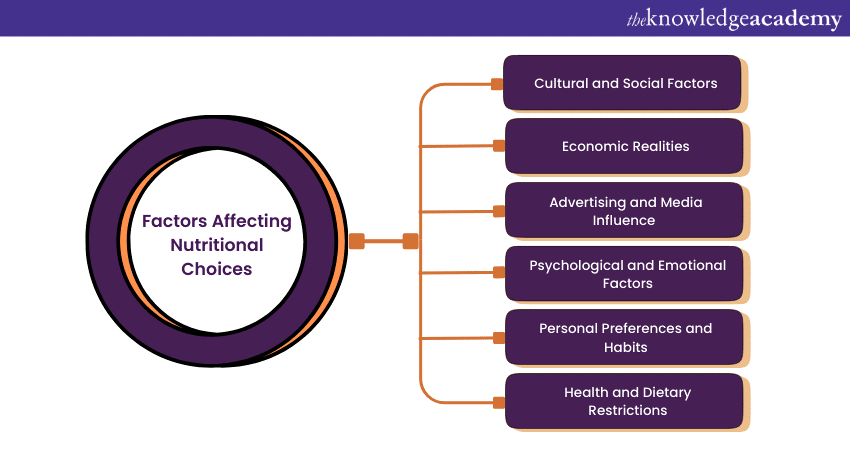
Cultural and Social Factors
Cultural heritage and social norms shape our diets through traditional dishes, culinary practices, and family recipes. Celebrations and communal meals reinforce these ties, while globalisation introduces new cuisines and lifestyles.
Economic Realities
Economic circumstances affect Nutritional choices. Affordability and accessibility determine what foods we can buy. Nutrient-dense foods like vegetables, fresh fruits, and lean proteins can be expensive, leading some to choose cheaper, calorie-dense options.
Advertising and Media Influence
Advertising and media often promote processed foods high in sugars, unhealthy fats, and sodium. These campaigns can influence us to prefer less nutritious options.
Psychological and Emotional Factors
Emotions and psychological states impact food choices. Emotional eating, driven by stress or mood, can lead to overeating or choosing comfort foods high in calories but low in nutrients.
Personal Preferences and Habits
Individual tastes and habits, formed in childhood and carried into adulthood, play a significant role in dietary patterns. Preferences for certain tastes, textures, and personal associations influence our choices.
Health and Dietary Restrictions
Health concerns and dietary restrictions, such as allergies, diabetes, and specific diets (e.g., vegetarianism), influence Nutritional decisions. Consulting a nutritional therapist can help address these needs effectively, especially when health goals like weight management or muscle gain also guide dietary choices.
Misconceptions About Nutrition
Navigating Nutrition can be confusing due to evolving science and prevailing misconceptions. Here are some common myths debunked:
All Fats Are Bad
Not all fats are harmful. Unsaturated fats, found in nuts, avocados, and olive oil, are beneficial for heart health, brain function, and overall well-being. These fats, including omega-6 and omega-3 fatty acids, support cell membranes and hormone production.
Skipping Meals for Weight Loss
Skipping meals can alter metabolism and lead to overeating later. Irregular eating patterns can cause muscle loss and decreased energy levels. Focusing on portion control and nutrient-dense foods, as highlighted in many Nutrition Books, is a better approach to weight management.
Carbs Are Always Bad
Not all carbohydrates are harmful. Complex carbs found in vegetables, whole grains, and fruits offer sustained energy, aid digestion, and enhance satiety. Opting for minimally processed, high-fibre carbs is essential.
The Power of Nutritional Education
Debunking these misconceptions requires a solid understanding of Nutrition. Knowledge about macronutrients, micronutrients, and metabolic processes empowers informed choices. Consulting dietitians and reputable sources can help separate fact from fiction, guiding healthier dietary practices.
Elevate your well-being with Yoga, sign up for our Yoga Course now!
Tips for a Balanced Diet
Maintaining a balanced diet isn't a simple task. It's a cornerstone of well-being that empowers us to harness the full potential of our bodies. Here are some essential tips to guide you toward a diet that fosters health and vitality:
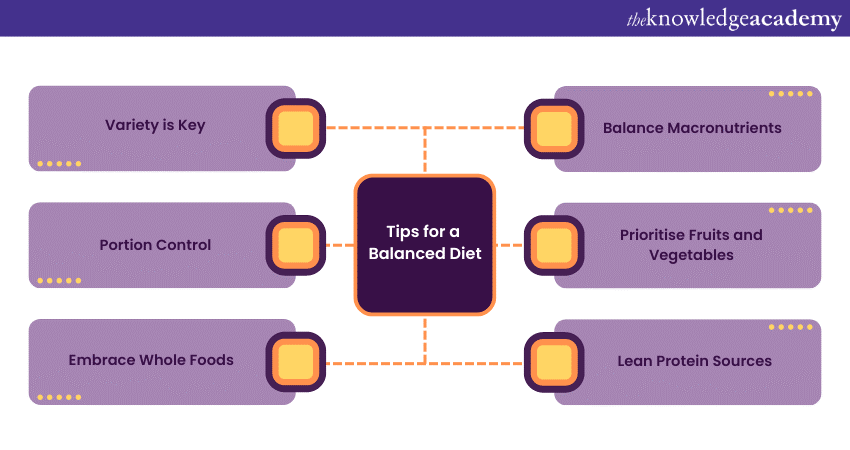
a) Variety is Key: Incorporate a diverse list of foods into your meals. Different foods offer a variety of Nutrients that collectively support your body's needs.
b) Portion Control: Be mindful of portion sizes. Overeating, even healthy foods, may cause excess calorie intake, which can lead to gain more weight.
c) Embrace Whole Foods: Choose whole, minimally processed foods whenever possible. These foods retain their natural nutrients and fibre content.
d) Balance Macronutrients: Include a mix of proteins, carbohydrates, and fats in your diet. These macronutrients work together to provide energy, support growth, and maintain bodily functions
e) Prioritise Fruits and Vegetables: Aim to fill half your plate with colourful fruits and vegetables. They're rich in vitamins, minerals, and antioxidants.
f) Lean Protein Sources: There is a variety of options for lean protein sources like poultry, fish, beans, and legumes. Protein supports muscle health, immune function, and tissue repair.
g) Choose Whole Grains: Brown rice, quinoa, and whole wheat are the options for whole grains. They provide more fibre and nutrients compared to refined grains.
h) Healthy Fats: Include sources of healthy fats, such as avocados, nuts, seeds, and olive oil. These fats are necessary for brain health and overall well-being.
i) Limit Added Sugars and Salt: Reduce your intake of foods and beverages that are highly rich in sugars and sodium. These can contribute to various health issues.
j) Stay Hydrated: To stay hydrated, drink plenty of water throughout the day. Hydration is vital for digestion, metabolism, and overall bodily functions.
k) Plan Ahead: To make healthier choices and avoid impulsive, less nutritious options, plan your meals and snacks in advance.
l) Listen to Your Body: Pay attention to your body's hunger and fullness cues. Awareness of eating helps prevent overeating.
Common Myths About Nutrition
Here are some widely believed myths about nutrition, along with the Nutrition Facts that debunk them:
Myth 1: "Carbs Make You Gain Weight"
Truth: Not all carbs are bad. Whole grains together with vegetables represent fundamental energy and nutritional sources because they contain complex carbohydrates. The focus on weight management should target refined carbohydrates and sugars above all else.
Myth 2: "All Fats Are Unhealthy"
Truth: Healthy fats, including polyunsaturated and monounsaturated fats which exist in olive oil and avocados and nuts benefit your brain health and help create hormones in your system. You should eliminate both trans fats from your food and should not exceed the recommended amount of saturated fats.
Myth 3: Refusing to eat your meals leads to reduced body weight.
Truth: The act of skipping meals triggers later excessive eating, which also causes a slowed metabolic rate Daily consumption of proper nutrition helps both maintain steady energy levels and control weight properly.
Myth 4: "You Need to Detox Regularly"
Truth: Your liver and kidneys operate naturally to detoxify every substance inside your body. Drinking "Detox" teas or consuming "juice detoxes" provides no health benefits and may even cause harm to your body. Water intake, together with a balanced diet fulfils your body's nutritional requirements.
Myth 5: "Supplements Can Replace Whole Foods"
Truth: Supplements help eliminate nutritional gaps between your diet and whole foods, but they cannot provide you with whole food's complete nutritional benefits, including Fiber and antioxidants or all nutrients working together.
Future Trends of Nutrition
These are the future trends of Nutrition:
a) Personalised Nutrition: Nutritional plans developed according to a person's genetics and microbiome help achieve maximum health benefits.
b) Plant-based Diets: Sustainable nutrition requires basing diets on plant-based foods while achieving health targets.
c) Functional Foods: Food products containing nutrients such as probiotics and omega-3 supplements offer dual advantages to human health.
d) Alternative Proteins: Sustainability challenges will find solutions through innovations which use lab-grown meat production and plant-based substitutes.
e) Digital Nutrition Tools: Wearable technology combined with smartphone applications helps users manage their diets by giving customised nutritional advice.
f) Gut Health Focus: Increased emphasis on probiotics and prebiotics for better digestion and immunity.
What are the 3 Core Elements of a Healthy Dietary Pattern?
The 3 Core Elements of a Healthy Dietary Pattern include:
a) Balance: A variety of nutrients from all food groups
b) Moderation: People need to maintain measuring portions and restrict their consumption of added sugars and unhealthy fats.
c) Variety: Varied food selections play an important role because they help both maintain adequate nutrients
Why Nutrition is Important?
Through nutrition, the body receives fuel, which enables both growth and cell repair, strengthens the immune system, and helps Increase Platelet Count. A complete nutritional diet controls the likelihood of heart disease and diabetes and obesity conditions while simultaneously increasing vitality and mental health. It’s key for lifelong health!
Conclusion
Nutrition is the foundation of a healthy life. Understanding What is Nutrition, components, and role in health empowers us to make proper dietary choices. For those looking to gain muscle, a 7-Day Meal Plan for Muscle Gain can further help support those goals. We can pave the way for a vibrant and nourished life by embracing a balanced diet and dispelling common misconceptions. Remember, every bite you take is a step toward a healthier you.
Transform lives, including your own, with our Life Coach, sign up for our Life Coach Course now!
Frequently Asked Questions
What is the 5 5 5 Rule Life?

The 5-5-5 rule directs people to focus exclusively on genuine vital aspects. Things that will not matter to you in five minutes should not stress you beyond five minutes during either five months or five years. This mindfulness practice helps you both sort out what needs attention from ordinary concerns and eliminate pointless fretting.
What is the Golden Rule for Nutrition?

Varied consumption of whole, unprocessed foods should occur in appropriate moderation. Optimal health comes through diligent food choices, which include fresh fruits with vegetables, lean proteins, whole grains and healthy fats, alongside diminishing both sugar and salt and unhealthy fats from dietary patterns.
What are the Other Resources and Offers Provided by The Knowledge Academy?

The Knowledge Academy takes global learning to new heights, offering over 3,000 online courses across 490+ locations in 190+ countries. This expansive reach ensures accessibility and convenience for learners worldwide.
Alongside our diverse Online Course Catalogue, encompassing 19 major categories, we go the extra mile by providing a plethora of free educational Online Resources like News updates, Blogs, videos, webinars, and interview questions. Tailoring learning experiences further, professionals can maximise value with customisable Course Bundles of TKA.
What is The Knowledge Pass, and How Does it Work?

The Knowledge Academy’s Knowledge Pass, a prepaid voucher, adds another layer of flexibility, allowing course bookings over a 12-month period. Join us on a journey where education knows no bounds.
What are the Related Courses and Blogs Provided by The Knowledge Academy?

The Knowledge Academy offers various Healthy Lifestyles Training, including the Active and Healthy Lifestyles Training, Nutrition Course, and Nutrition and Fitness Training. These courses cater to different skill levels, providing comprehensive insights into 5 Ways to WellBeing.
Our Health & Safety Blogs cover a range of topics related to Nutrition, offering valuable resources, best practices, and industry insights. Whether you are a beginner or looking to advance your Healthy Lifestyle skills, The Knowledge Academy's diverse courses and informative blogs have got you covered.
Upcoming Health & Safety Resources Batches & Dates
Date
 Life Coach Training
Life Coach Training
Fri 11th Apr 2025
Fri 13th Jun 2025
Fri 15th Aug 2025
Fri 10th Oct 2025
Fri 12th Dec 2025






 Top Rated Course
Top Rated Course



 If you wish to make any changes to your course, please
If you wish to make any changes to your course, please


